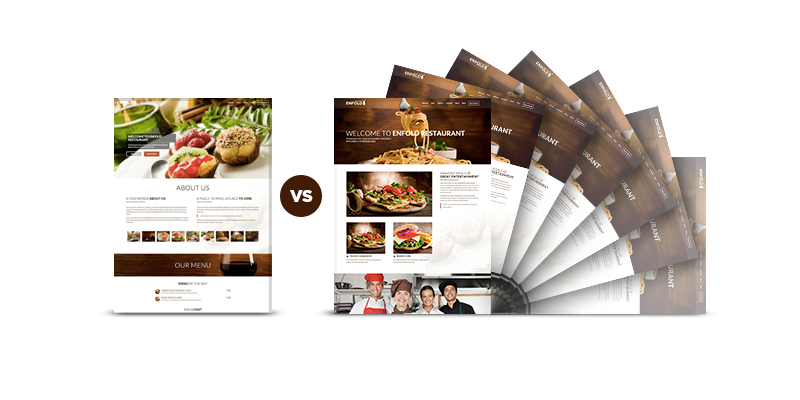
Single Page or Multiple Page Design – What’s Better For Your WordPress Website?
Choosing between Single or Multi Page Designs sometimes requires a lot of thought. Here are a few guidelines that might help you.
Those familiar with WordPress’ history will know that it has its roots placed firmly in blogging.
But fast-forward to present day and you are arguably as likely to see a ‘traditional’ website running on WordPress than you are to see a blog. The world’s favorite Content Management System (CMS) has come a long way since its b2/cafelog days. And while creating a WordPress website that doesn’t operate as a blog is now a piece of cake, that added functionality opens up a veritable Pandora’s box of questions.
In this article I want to address one of those questions: should you choose a single page or a multiple page design for your WordPress website? With the growth in popularity of single page designs over the past year or so, it is a more relevant question than ever. Once you’re done reading this piece, you’ll know which option is right for you.
How Your Business Affects Your Website Design
The most important consideration when it comes to choosing between a single page or multiple page design is what your goals are as a business when it comes to online marketing.
If you want to create a website that acts more as an online brochure than anything else, a one page design may be the ideal choice. Rather than struggling to fill up a number of pages with information on a multiple page design, you can include all of the information that prospective customers will need on one page; including relatively brief sales copy, customer testimonials, contact details and more.

Enfold’s One Page Template.
Meanwhile, if you intend to use your website for further-reaching online marketing efforts, a multiple page design is almost certainly the way to go. Similarly, if you simply have a lot to say on your site (detailed product descriptions, blog articles and so on), a multiple page design is likely to be the best option.

Enfold’s Multiple Page Template.
Ease of maintenance could also be a consideration. While WordPress is extremely user friendly, maintaining a single page is likely to be a far easier process than multiple pages. And the issue of maintenance should come under greater scrutiny if you’re going to have multiple members of staff updating the site. It is advisable to make the process for them as simple as possible, especially if they are not familiar with WordPress.
Creating the Best Possible User Experience
The ease with which visitors can navigate your site can make all the difference between a sale or a lost opportunity.
Positive user experiences have direct knock-on effects for Search Engine Optimization (SEO) too. Google ultimately wants to rank sites that people not only find informative, but also easy to navigate, and their algorithm is geared in part towards that.
So how does the user experience apply towards single and multiple page designs? There is no right answer on this front. Well-designed single page sites can have an intuitive flow to them, making the process of obtaining key information very easy. However, there is a balance to be struck. As soon as you have more than a moderate amount of information to convey, a multiple page design is likely to create a better user experience.
As a rule of thumb, if scrolling through your single page site begins to feel like a laborious and confusing task, it’s almost certainly time to switch to a multiple page design.
Designing a Site for Search Engine Rankings
SEO is an extremely important facet of online marketing. It’s also often overcomplicated to the point of absurdity.
In reality, so much of the value of SEO is rooted in the basics. And while there’s not room to delve into the details in this article, I do want to focus on how your choice of design can affect Google’s ‘opinion’ of your site.
It is easier to target individual keywords on a per-page basis with a multiple page design, potentially leading to numerous rankings for specific ‘long tail’ keywords. For example, you could have a page targeting “how to cook sushi” while another targets “how to cook poultry”. These are distinct phrases, both of which are related but will contain different information. Google loves this.
Meanwhile, targeting distinct keyword phrases on a single page design can quickly get messy. While a single page design can rank well for multiple closely related keywords, Google is far less likely to apportion a number of loosely contextually related keywords to your site’s single page.
Furthermore, the lack of available space in a single page design could mean that the keywords you attempt to rank for are contained within content that isn’t long enough to be of much real value (at least in Google’s algorithmic eyes).
In theory, multiple pages gives your website multiple chances of being ranked for multiple keywords, but it’s not that straightforward in reality. There are many factors to consider, and it can quickly become overwhelming, so my advice is to focus on what you think is best for the visitor.
Ultimately, Google is trying to perfect algorithms that present the most intuitive, informative and relevant pages on their search engine results pages. So rather than focusing heavily on SEO, focus on providing your visitors with the most informative and relevant content in the most intuitive design. Whether this is a single page or multiple page design is likely to be very personal to your business.
Matt Cutts, head of the webspam team at Google, has commented and produced a video on multiple page versus one page designs. Shown below, the video outlines his thoughts on the decision. In short, you should be building your website for your users rather than search engines.
Choose What Is Right For Your Business
There is often no right or wrong answer when it comes to the question of which is the ‘best’ option between single page and multiple page designs.
There are however factors that can push you in one direction. Let’s finish off by rounding up the most important factors.
Choose a one page design if you:
- don’t consider online marketing a priority
- need a relatively simple solution
- don’t have a lot of content
Chose a multiple page design if you:
- intend to invest in online marketing
- have a lot of content to add to your site
- will be publishing blog content regularly
- consider search engine rankings a priority




Hey
thanks for sharing your thoughts and advices about this upcoming decisions on marketing one page or multiple page. At least our customer will decide but with your listing of factors is now a little bit easier to support them…
greats from munich
Stanko
I was wondering, which type will suit my business.
Thanks.